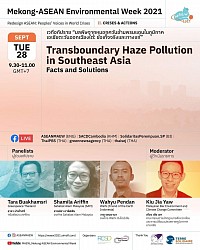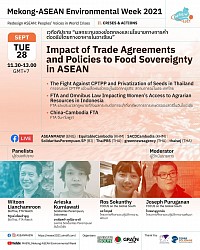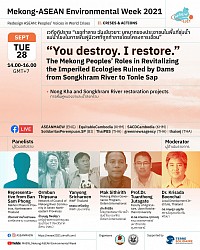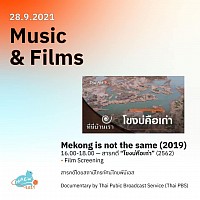28 September 2021
Panel discussion “Transboundary haze pollution in Southeast Asia: Facts and solutions”
28 September, 9.30-11.00 am (Bangkok time)
Organizers: Project SEVANA South-East Asia, Social Science and Sustainable Development (RCSD), Chiang Mai University, Thailand
Panelists
- Tara Buak hamsri, Greenpeace Thailand https://youtu.be/XkK79knLDUU
- Wahyu Pendana, Walhi (Friend of the Earth Indonesia)
- Shamila Ariffin, Sahabat Alam Malaysia (SAM) https://youtu.be/vbrVESKYkbw
Moderator and commentator
Kiu Jia Yaw, Malaysian Bar Environment and Climate Change Committee
Watch the video of this panel https://youtu.be/6W0Mm0t7pOA
Panel discussion “Impact of trade agreements and policies to food sovereignty in ASEAN”
28 September, 11.30 am-13.00 pm (Bangkok time)
Organizers: GRAIN, FOCUS, Alternative Agriculture Network
Panelists
- “The fight against CPTPP and privatization of seeds in Thailand” by Witoon Lianchamroon, BioThai/FTA Watch:
- “FTA and Omnibus Law impacting women’s access to agrarian resources in Indonesia by Arieska Kurniawati, Solidaritas Perempuan, Indonesia
- "China-Cambodia FTA" by Ros Sokunthy, Focus on the Global South https://youtu.be/ELM6spSNH5I
Moderator
Joseph Puruganan, FOCUS on the Global SouthWatch the video of this panel
Background
The on going COVID-19 pandemic does not seems to halt governments and corporations to continue pursue further trade liberalisation. On the contrary, several critical trade deals were concluded, taking advantages of the pandemic restrictions that limiting the ability of civil society and larger social movements to intervene.
After 8 years of negotiations, the Asia Pacific mega-trade deals RCEP were concluded and signed by 15 of its member countries in November 2020. UNCTAD assessment stated that RCEP will be a hurdle for countries to restore their economic conditions post-pandemic as it has strict rules and regulations that makes it difficult for countries to adjust with the new reality. Meanwhile several other trade agreements continue to be negotiated between ASEAN member countries with their trading partners, unbothered by the stark reality of food and health crisis.
Thailand government decision to consider joining CPTPP have led to nationwide protests, where farmers and civil society that lead the fight raise concern on the CPTPP condition that oblige Thailand to be member of International Union for the Protection of New Varieties of Plants or UPOV, said that it will risk Thai farmers and make them depend to industrial seed, UPOV makes it illegal – a criminal offence — for farmers to save and reuse protected seeds. Similar situation taking places in Indonesia as the country continue pursue trade deals with European countries that jeopardise farmers rights over seed for the interest of oil palm plantations as well as European fishing industries.
This session is taking stock on trade agreements and policies that ASEAN member countries are negotiating or signing in, their challenges to food sovereignty in ASEAN and initiatives from communities and civil society organisations to protect the rights of peasants, indigenous communities, fisherfolks and other small scall food producers and local markets against further privatisation and liberalisation.
A discussion among the local “You destroy. I restore: the Mekong peoples’ roles in revitalizing the imperiled ecologies"
28 September, 14.00-16.00 pm (Bangkok time)
Organizers: Mekong Butterfly, Mekong communities Network
Panelists
Assanai Srasungnern, WWF-Thailand
- Wimonjan Tiyabut, Ban Sam Phong community, Ban Sam Phong sub-district, Si Songkhram district in Nakhon Phanom Province in Northeastern Thailand
- Ormbun Thipsuna, Network of Council of Mekong River Community in Seven Northeastern Provinces
- Mak Sithirith, Research and Policy Coordinator, Oxfam, Mekong Water Governance Program https://youtu.be/o7ilAClsLeM
- Prof.Dr. Tuanthong Jutagate, Faculty of Agriculture, Ubon Ratchathani University
Moderator
Dr. Krisada Boonchai, Director of Local Development InstituteWatch the video of this panel
https://youtu.be/zc7CiBdw_wU
Concept
The complexity and diversity of the Mekong River ecologies throughout the six countries that this mighty river flows through and connects, from the Tibetan Plateau to the Delta in Vietnam, are the life elements that nourish millions of people, unique local cultures, and food security. The Mekong River is the aorta of the lower Mekong region, feeding local fisheries, agriculture, and foods with fertile sediments she brings with. One of the most crucial ecosystems of the Mekong River is her wetlands. Wetlands are peoples' sources of water and clean air, habitats, and nurseries for young animals, food, and raw materials. Many rare species only inhabit these wetlands. Tonle Sap is the largest freshwater lake and wetland in ASEAN, spanning over 7,500 square kilometers across five provinces of Cambodia. Over 300 wild animals and aquatic lives reside in Tonle Sap. In 2018, Stung Sen, located at the edge of Tonle Sap, became designated as an internationally renowned Ramsar site.
The Songkhram River is one of Thailand’s important wetlands. Her nickname, the Little Tonle Sap, signifies a large fertile wetland with great biodiversity. In the rainy season, the Songkhram River becomes a large freshwater lake, flooding over 600,000 rai. Within the flooded area at the lower Songkhram basin stand diverse forests spanning over the lowland to the mainstream and tributaries. The local community calls these wetland forests “Pa Bung-Pa Tham” (flood forests). The lower Songkhram basin is also a Ramsar site, designated as Thailand’s 15th and the world’s 2,420th Ramsar site on 15 May 2019.
The Mekong ecologies are disturbed by large-scale development projects such as hydropower dams in China and along the river down to Cambodia. More dams are planned. The adverse impacts of the Mekong dams are visible today. Unseasonal water level fluctuations. Severe droughts lead Tonle Sap to dry out. Disappeared sediments and riverbank erosion, especially at the Mekong delta in Vietnam. The very little response to these threatening ecological impacts is shocking. In contrast, the Thai government, led by the Office of National Water Resources, re-introduces the Songkhram dams project to build two dams on the Songkhram River: at the river mouth and the mid-section about 135-km from the mouth of the river. The Songkhram dams project would create a large reservoir, permanently inundate the flood forests in Nakhon Phanom and Sakon Nakhon. This area, known locally as the uterus of the Mekong River, is critical for migratory Mekong fish to breed, lay eggs and nurse their juveniles.
This panel spotlights the roles and concepts local people and activists in two of Mekong basin’s most significant wetlands--Songkhram River and Tonle Sap--use to navigate their relationships with nature. A representative from the Ban Sam Phong community will share how the people set up conservation sites to manage the changing ecosystems by restoring local ecosystems without disturbing the whole ecosystem. Civil society groups from Tonle Sap will share how they handle the impacts of hydropower dams. Their views can guide us to see the differences in concepts towards development between the peoples and government sectors at the national and regional levels. Their views can show us how conservation and restoration narratives actually pave the way for large-scale development projects to be ecologically detrimental. The differences in goals and expected outcomes between the two parties call us “rethink and redesign” what we understand as development. What should we be paying attention to? Who are the key stakeholders, and who needs more space to voice out? How might we liberate ourselves from an archaic and failing discourse that omits us from seeing respect, empathy, and open collaborations? How might we overcome the obsolete centralized water “management” to explore more on water “protection”?
Mekong is not the same
Documentary - “Mekong is not the same” (2019) by Thai Public Broadcast Service (Thai PBS)
Watch the video
https://drive.google.com/file/d/1F_SBm0P_cWgSucxrcMYZGLtn0VTo-er-/view?usp=sharing




